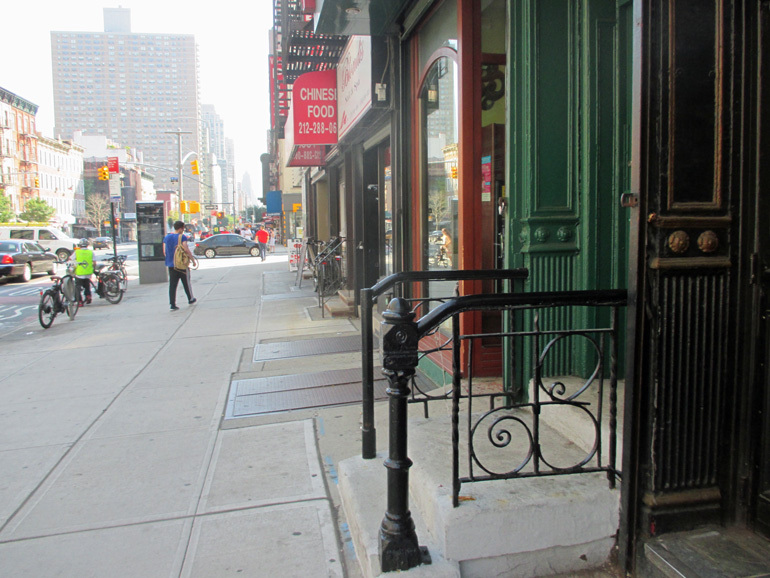24, 25, and 26 July

Tuesday 24th
Last night, I finished reading Jane Jacobs’s The Economy of Cities for the first time.
I had paused in the middle of re-reading her Cities and the Wealth of Nations when it finally struck me, what ought to have been obvious much sooner, that Cities is the second half of a two-volume treatise on urban economies. I read it, when it came out in 1984, in all ignorance of this fact; I hadn’t even read The Death and Life of Great American Cities (though I’d heard of that one). I learned so much from Cities, most of all the possibility of a humanist economics, that what I missed from not having read the first book might only have gotten in the way of my burgeoning grasp of something I’d never given much thought to (political economy) — had, that is, I read The Economy of Cities in 1984 as well.
Reading The Economy of Cities now, nearly fifty years after its appearance in 1969, my first reaction was an explosion of rage. Why was I not taught this book in school? It was unbearably mortifying to know that I had been holding forth on all manner of subjects for half a century without being aware of, among other nuggets, Jacobs’s brilliant hypothesis that agriculture originated in cities, not in the countryside! Ignorance of such an elemental insight threatened to invalidate every notion that I’d ever had.
When I simmered down, though, I saw that there were a few things that I would have missed way back then, no matter how forcibly Jacobs tried to express them. The less important of these blockages would have involved the singularity of the Industrial Revolution, which initiated all of the urban activity that Jacobs talks about, aside from those Stone-Age speculations about agriculture. Fifty years ago, it was easy to imagine that the Industrial Revolution was going to go on indefinitely. Even Jacobs, in her final pages, suggests that this might not be the case, but I’m not sure that I’d have taken the hint. The more important issue is one that, although she certainly describes it, she never identifies, and that is chaos.
Chaos is really nothing but unpredictability. When everything is unpredictable, life of any kind cannot be sustained, but a healthy economy requires a kind of organized unpredictability that continually refreshes the world of work. It’s important to state right away that we don’t know how to create or manage such organized unpredictability; at present, we can only appreciate it in retrospect. Unpredictable successes might be imagined as trains that go off the rails, only instead of heaving into disorder, these very special trains create new rails. Jacobs tells many interesting stories involving such felicity, and my favorite is the one about Ida Rosenthal, the inventor of the brassiere. As a New York dressmaker, Rosenthal was unhappy with the fit of her clothes on her customers, so she designed an undergarment to improve it. But the thing about the invention of the brassiere is not that Rosenthal came up with it but that she decided to devote her working life to it. She stopped making dresses and started Maidenform, manufacturing brassieres first in New Jersey and then in West Virginia.
Another dressmaker might have been prompted, by the same dissatisfaction that motivated Ida Rosenthal, to invent the brassiere, but then that dressmaker might also have simply gone on doing what Rosenthal did at first: she simply gave brassieres to her customers. We might, were we privy to all the ins and outs of the current state of dressmaking in 1920, have been able to foresee something like the brassiere, but we should never have been able to predict that its inventor would decide to change careers, to give up cutting and sewing individual gowns in order to take up the mass production, cut and sewn by “workers,” of a single product.
The only thing that we can be sure of is that unpredictable successes are undertaken almost exclusively by the self-employed — or by those who are in a position to become what Jacobs calls “breakaways.” Another fine instance of creative chaos is provided by the young engineer in Southern California who left Douglas Aircraft after the war to start up a business manufacturing furnaces. The furnace idea turned out to be a bust, so the engineer took up sliding glass doors, a novelty for which there was a market in booming Los Angeles. There is no way that Douglas Aircraft would have sponsored the research and development, and then the manufacture, of sliding glass doors. The customers of Douglas Aircraft were not looking for sliding glass doors. Only stand-alone producers can decide, as Ida Rosenthal did, to change their customers.
For every success story, though, there are at least a few, and possibly dozens, of failures. To say that trial and error do not guarantee eventual success is to indulge in cruel understatement. Trial and error lead nowhere without help from the Mercury of chaos, whom we call luck. Meanwhile, who is to pay for all the effort that, while arguably not absolutely wasted, fails to make a sale?
Now, as we all know, Jane Jacobs hated planners. But The Economy of Cities is itself, at least implicitly, a blueprint. If you want your city to have a robust economy, it says, then here’s what you need. And what you need, although Jacobs quite understandably doesn’t emphasize it, is a lot of money thrown out the window. Who’s going to sign up to be in charge of that department? Who wants to play VC to breakaways that are only going to break down? How do we plan for innovation in a world where, when most trains run off the rails, nothing but disaster ensues?
Fifty years ago, none of these questions would have occurred to me. I’d have imagined instead a world in which, thanks to the discovery of the right scientific secrets, everyone would be Ida Rosenthal.
***
Wednesday 25th
There’s a big piece about Brexit in the current issue of The New Yorker, by Sam Knight. Having assiduously followed the Times‘s account of this slow-motion disaster, which still seems to me to be much worse than anything happening in the United States, and having been tipped from the start by what has turned out to be a spot-on analysis of Theresa May’s political character, published by David Runciman in the LRB a few months after she took office, I was not surprised by anything new in Knight’s resume. But Knight did capture a comment, made by “a senior EU official” in response to the resignations of Boris Johnson and others that followed May’s Chequers ultimatum on 6 July.
“It’s a moment that should have happened two years ago,” the official said, of May’s late attempt to soften Brexit. But the official stressed that the E.U. still would not accept her plan, which aims somewhere in between a free-trade deal and the more integrated ties of the E.E.A. nations. “The point of departure for the U.K. is ‘We are exceptional,’ ” the official said, sighing. “They don’t understand.”
Perhaps it was always going to be a problem for the former seat of empire, the ruler of the planet’s oceans and the overseer of its international compacts to see itself as no more than the equal of neighbors to whom for centuries it condescended. Knight captured another, even pithier comment, this one made by Kristian Jensen, Denmark’s Finance Minister. According to Jensen, there are two types of nations in Europe: small nations, and nations that don’t yet realize that they are small. Great Britain, which during my lifetime has staggered from the imperial metropole to the den mother of a ceremonial association of former colonies whose half-siblings have little use for each other, to the frequently mortified junior partner of a “special relationship” with the United States, often behaves like a reduced gentlewoman who insists on privileges she can no longer afford.
The purpose of Brexit, seen in the best light, is to restore total sovereignty to the UK. Easier said, it turns out, than done! Those who voted for it doubtless assumed that interfering Continental regulations were all contained in a book that could be binned. They had no idea of the “acquis,” the extensive interpenetration of those regulations into hundreds of English statutes, such that nobody can now tell the domestic from the foreign — because, as a matter of law, there is no difference! From the start, it ought to have been obvious that the only way to achieve Brexit’s goals was from within the EU.
The Brexit campaign, as everybody understands now, was a dog’s breakfast of Leave’s grotesque misrepresentations of facts and figures fermented by Remain’s criminal complacency; as with Donald Trump’s presidential campaign, there will probably always be many who believe that the winners always intended to lose. As such, the vote ought to be stamped invalid. The referendum itself was engendered by such deep cynicism that there ought to be no talk of a second try. Parliament ought simply to direct the Prime Minister to proceed to Brussels on bended knee to beg that the Article 50 filing be rescinded. Then, and only then, can the twenty-eight members of the European Union take up the issue that bothers all of their populations: Has the EU gone too far? Or, as I put it, are France and Germany too big? What a difference it would make if Berlin and Paris ceded their authority to the constituent states and regions of the Union’s principal founders!
Beyond that, Europe must put a great deal more effort into creating a future in which non-Europeans are happy to remain where they are. The unsavory aftermath of colonialism must be cleared away. In other words, Europe will have to turn its back on global neoliberalism with a firmness that makes American persistence even more embarrassing than it already is. It is time to stop exploiting and “developing” the less fortunate economies of the world, and instead to help them grow flourishing markets of their own — and on their own terms.
***
Thursday 26th
Having finally pushed my way through the final chapter of Quinn Slobodian’s Globalists, after letting the book settle at the bottom of the pile for a dangerously extended hiatus, I’m considering whether or not it makes sense to continue my meditations on the word “liberal.” The word signifies too many different things, some of them good, some of them almost vile. Actually vile, as Domenico Losurdo makes clear in the pages of Liberalism that critique the staunch liberal case for slavery.
A word about Globalists: it was one of those books that leave me at sea. I could never tell from the text itself what Slobodian made of the theories that he was summarizing; only in the introductory material does he suggest that his book is an act of atonement for not participating in the Seattle manifestations of 1999. I looked in vain for a description of “ordoliberalism.” The term “cybernetic” was never quite properly grounded: what exactly did it mean to Hayek and his friends? Slobodian makes explicit the more recent neoliberals’ allegiance to property rights and corresponding opposition to democracy (that is, to democratically instigated expropriations), but he never comments on it. Whatever he might think of it, though, I did not find that this particular res simply spoke for itself. And, while it would have taken him on a tangent, how could he resist the hypocrisy of neoliberals such as Richard Perle and Douglas Feith, who claimed to be passionately committed to democracy in Iraq, when what they really wanted was a régime that would protect the property rights of foreign investors?
I also think that Slobodian might have invested some effort in explaining the imperial origins of neoliberalism. Imperial globalism was a peculiar and manifestly impermanent blend of developed economies and territories of commodity extraction. The goal of developing former colonies into actual competitors with the former centers of empire was never sincere, which is why it has never succeeded.
If neoliberalism is antagonistic to democracy, then, what about just plain liberalism?
The relationship between neoliberals and colonial populations is not quite the same thing as that between liberals and peasant populations, but there are certainly similarities, if ultimately the outcomes were different. (Until recently, that is.) If neoliberalism is a mutation of liberalism caused by imperial and post-imperial conditions, it is also true that liberalism itself was deformed by the Industrial Revolution. The origins of liberalism do not lie in democratic impulses.
The first liberals were grandees who intended to put a stop to royal caprice. After the liberal triumph of 1689 in England, the monarch was no longer free to interfere with private property — which, at the time, meant the private property of great landowners and merchants. (The property of middling people, such as it was, was protected by local customs with which the crown had long since ceased to interfere, a quiescence which has done much to give England its reputation for precocious democracy.) Among the property rights of these grandees was felt to lie the right to an orderly government, and as I have written earlier, it was established, in the decades following the Glorious Revolution, that the king could take the advice of anyone he liked, so long as that person were the chosen leader of Parliament, with a strong preference for the elected leader of the House of Commons. In the Eighteenth Century, the liberal dispensation of British politics, which is still in force, began to flourish.
With the Industrial Revolution, however, the nation was confronted by a new phenomenon. As grandees put their property to work in the development of factories and the like, they drew forth from the countryside a population of peasants who had never owned much of anything, and who therefore had little or nothing for the law to protect. These peasants did not, to say the least, vote; they quite literally counted for nothing. The idea that every human being owns his or her own body, and that, in parallel to the grandee’s expectation of orderly government, anyone might claim of the body politic a minimum of human decencies, in the way of food, clothing, shelter, and access to a better life — that, in short, the truly liberal state must liberate each and every person — citizen! — from any condition suggestive of bondage — took a long time to develop. The oppression of workers in the new factories might be universally deplored as cruel, but it was not for a while regarded as necessarily illiberal.
I think it safe to say, though, that liberal democracy, as it grew through the Nineteenth and Twentieth Centuries, not only greatly extended the protection of property rights but augmented the range of property protected. Professional credentials, for example, became “as safe as houses.” Home ownership, perhaps not a very good idea in itself, made a mini-grandee of anyone who could afford it — and it was made very affordable. Unfortunately, the growth of liberal democracy was repeatedly defeated wherever it came into conflict with pre-existing racial bigotries. Eventually, liberal leaders would create a social crisis whose measure still remains to be taken when they committed their governments, in response to Communist equalitarianism, to overruling racist exclusions. That is how “liberal” became a term of abuse.
Meanwhile, empires came and went, leaving the neoliberal commitment to a globalism in which property rights were “encased,” as Slobodian nicely puts it, or protected from local government interference. Foreign investors were to be granted “xenos rights” that might exceed the property rights of natives. Inevitably, this global arrangement altered the commercial fabric of the developed countries, leading among other things to the familiar phenomenon of job exportation. Workers in the United States found themselves no more protected from globalist currents than workers in Borneo. For reasons not hard to seek, “liberal” became a term of quite different abuse, hurled by people who might well consider themselves the political opponents of those who complained of “liberal politicians.”
A mess, but such, I think, is the state of play.
Bon week-end à tous!




